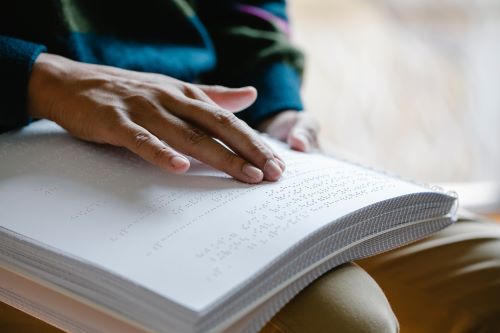Summary | Excerpt | Reviews | Beyond the Book | Read-Alikes | Genres & Themes | Author Bio

A Memoir at the End of Sight
by Andrew LelandThis article relates to The Country of the Blind
 In The Country of the Blind, Andrew Leland sings the praises of Bookshare, an electronic repository of accessible-format books for the disabled. Bookshare was launched in 2001 by Jim Fruchterman, the leader of Benetech, a Palo Alto-based nonprofit that develops technologies to assist those with physical and learning disabilities. The Bookshare mission is stated thus: "Bookshare makes reading easier. People with dyslexia, blindness, cerebral palsy, and other reading barriers can customize their experience to suit their learning style and find virtually any book they need for school, work, or the joy of reading."
In The Country of the Blind, Andrew Leland sings the praises of Bookshare, an electronic repository of accessible-format books for the disabled. Bookshare was launched in 2001 by Jim Fruchterman, the leader of Benetech, a Palo Alto-based nonprofit that develops technologies to assist those with physical and learning disabilities. The Bookshare mission is stated thus: "Bookshare makes reading easier. People with dyslexia, blindness, cerebral palsy, and other reading barriers can customize their experience to suit their learning style and find virtually any book they need for school, work, or the joy of reading."
Bookshare can be joined by paying a subscription fee or, often, via subsidization by governments or charitable bodies. The U.S. Department of Education's Office of Special Education Programs (OSEP) offers free access to Bookshare for all students with a print-reading disability. In the UK, a partnership with the Royal National Institute of Blind People (RNIB) allows parents, students and teachers to use Bookshare services for free. A full list of the international membership partners is available here. Nearly a thousand publishers regularly contribute to the Bookshare library, which offers material available in braille, DAISY (read aloud by a synthetic voice), EPUB, MP3 and Microsoft Word. Other suppliers include libraries, universities, individual authors and volunteers. The stock now numbers over one million books and includes recent releases.
An additional free source of braille and audio materials for disabled people in the US is the National Library Service for the Blind and Print Disabled (NLS).
I contacted two blind friends in the UK to ask what services they use. One told me that Bookshare "has an amazingly wide range of material, which would otherwise not be accessible," including obscure textbooks and language learning materials. They both download audiobooks from the RNIB Library (to a smartphone app called EasyReader) and Audible. Hardcopy braille books can also be borrowed from the RNIB Library. One friend reads e-books using a text-to-speech converter on a phone and has an electronic braille display that connects via Bluetooth.
In his memoir, Leland describes his sometimes difficult adjustment to using a screen reader and learning braille. However, he is grateful that, through these and other assistive technologies, the visually disabled are given opportunities to remain bookworms. He writes, "while I'm losing print, I'm not losing literature itself, which exceeds the eyes. … I'm still a reader."
Closeup photo of person using braille by Eren Li, via Pexels
Filed under Society and Politics
![]() This "beyond the book article" relates to The Country of the Blind. It originally ran in August 2023 and has been updated for the
July 2024 paperback edition.
Go to magazine.
This "beyond the book article" relates to The Country of the Blind. It originally ran in August 2023 and has been updated for the
July 2024 paperback edition.
Go to magazine.
Your guide toexceptional books
BookBrowse seeks out and recommends the best in contemporary fiction and nonfiction—books that not only engage and entertain but also deepen our understanding of ourselves and the world around us.